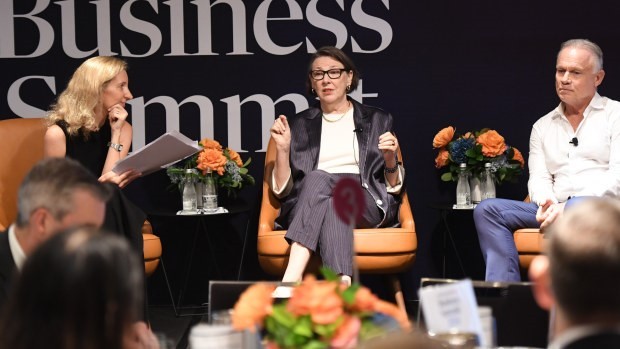
19.03.24
Why business leaders can’t cope with criticism
Business leaders who use reputation specialists and chiefs of staff become unable to hear dissenting voices or handle public criticism, speechwriter and author Lucinda Holdforth says.
Ms Holdforth – a former speechwriter for ex-Qantas chiefs Geoff Dixon and Alan Joyce, as well as a former adviser to insurer IAG, financial services company AMP and the ABC – said top chief executives who surrounded themselves with “yes people” were unable to calmly present their arguments in public forums such as Senate committees, annual shareholder meetings and media interviews.
“There is an apparatus that has grown up like a court around so many of the very top business leaders, but even further down the chain. They think listening means asking those people what they think,” Ms Holdforth said in a discussion at The Australian Financial Review Business Summit.
In a Four Corners interview last month, outgoing Woolworths CEO Brad Banducci asked for comments he had made to be cut from the final program. When the request was denied, he attempted to end the interview.
Ms Holdforth, a former policy adviser to Kim Beazley, blamed American leadership expert Brene Brown for today’s emphasis on leadership traits such as empathy, vulnerability, humility and authenticity.
Leaders, said Ms Holdforth, needed integrity, honesty and the means to harness resources and take people towards a shared vision of an organisation.
“There are many different ways to be a good leader. If you’ve got a vision, you know what resources you need, how to deploy what you’ve got, and you can attract followers to your cause, then you’re the one for the job,” Ms Holdforth said.
Soft skills have a place
Mark Fitzgibbon, who has been chief executive of health insurer NIB for more than 20 years, agreed that vision was critical for leaders, adding it was important to deliver short-term wins to keep staff buoyed.
“Leadership and communication is so important. We have huge obligations to get people to believe that what the company or organisation is trying to achieve is actually possible,” he said.
However, Mr Fitzgibbon said he was a fan of soft leadership skills, including authenticity and vulnerability. He pointed to the importance of inclusion and taking other people’s ideas into account.
“[Writer and lecturer] Dale Carnegie said: ‘People listen to us when we listened to them’. It sounds cheesy, but it’s so true. It’s about accommodating other peoples’ views in whatever resolution you reach. It’s just so important,” Mr Fitzgibbon said.
Company stances silence staff
Ms Holdforth, referring to the Indigenous Voice referendum, questioned the trend for companies to speak out on social issues, arguing companies should not take positions on behalf of all employees, some of whom may not agree with the stance.
“All day [workers] are silenced by all the rules and regulations of the company. So not only are they silenced [by them], but suddenly the board and the managing executive presume to speak for them. I think that needs rethinking. I don’t have an answer to that, but to me, it feels very wrong,” Ms Holdforth said.
Mr Fitzgibbon argued it was appropriate for companies to voice an opinion on social issues in some circumstances, particular if the matter was in line with their company purpose.
Sally Patten edits BOSS, and writes about workplace issues. She was the financial services editor and personal finance editor of the AFR, The Age and the Sydney Morning Herald. She edited business news for The Times of London. Connect with Sally on Twitter. Email Sally at spatten@afr.com


